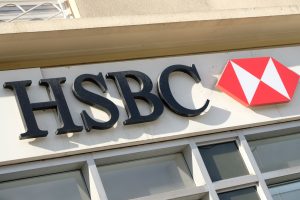The decision by insurer Ping An, HSBC’s largest shareholder, to publicly call for the British-based bank to break up its Western and Asian operations has once again exposed HSBC’s untenable position.
Coming in the same week that it was revealed that HSBC is privately advising Chinese officials and regulators on how to protect China’s overseas assets in case of U.S. financial sanctions, Ping An’s call highlights the growing difficulty for a Western bank that is betting its future fortune and growth on China.
In HSBC’s case, the bank finds itself in the unenviable position of having nearly one-third of its customer accounts by value in Hong Kong, nearly a third in the U.K., and the final third split globally, including in mainland China. This is what one might describe as being stuck between a rock and a hard place, as relations between the West and China continue to deteriorate.
Not least, because HSBC in the last two years has been accused of actively participating in the ongoing human rights crackdown in Hong Kong. HSBC not only publicly backed the draconian National Security Law, alongside Standard Chartered and other British-based businesses, but has frozen the bank accounts of prominent pro-democracy activists in exile at the behest of Beijing.
It is this active complicity that recently led to a group of U.S. lawmakers to write to the bank demanding answers as part of the Congress’ oversight of the Hong Kong Autonomy Act.
HSBC executives have long pleaded political agnosticism, claiming that the bank simply follows the laws of the jurisdictions it operates in. Yet, the crisis in Ukraine, which has seen an exodus of Western banks, and the growing market for ESG products, which claim to support “human rights” and which HSBC wholeheartedly markets, make it increasingly difficult to accept these statements. After all, the bank has joined its contemporaries and closed its retail banks in Russia, actively supported the Black Lives Matter movement, and recently launched an initiative make it easier for Afghan refugees to open bank accounts.
Nor is it fair to characterize the bank as an impartial observer or ignore the fact that it is a self-interested player with far too much skin in the game.
In the U.K., HSBC is one of the largest donors to the China All Party Parliamentary Group, providing 11,000 British pounds annually in sponsorship for U.K. parliamentarians to travel to China and meet with Chinese officials. It also provides funding indirectly to the Foreign, Commonwealth, and Development Office through the Great Britain China Center’s Future Leaders Program, which is described as “a strategic initiative to prepare the UK’s future political, government and business leaders to respond pro-actively to the growing role and influence of China.”
When it comes to its “lobbying” and advisory efforts, HSBC boasts the former British Ambassador Sir Sherard Cowper-Coles and the former No.10 Downing Street Advisor Lord Edward Udny-Lister as advisors on its payroll. In the last year alone, the bank has met with trade ministers 15 times, with treasury ministers 27 times, with business ministers nine times, and with Cabinet Office ministers six times, including three meetings with the U.K. prime minister.
In Hong Kong and Beijing, HSBC is similarly seen as an important insider and voice consulting the government day to day, particularly given that the bank raises two-thirds of its pre-tax profits in Hong Kong and owns over 62 percent of Hang Seng Bank.
The bank’s non-executive director, Laura Cha, is not only the chairperson of the Hong Kong Stock Exchange, but a close friend of outgoing Hong Kong Chief Executive Carrie Lam, and a member of the Hong Kong Executive Council. In addition, the CEO of HSBC Asia-Pacific, Peter Wong, was appointed to represent the financial services sector in July last year on the selection committee overseeing Lam’s replacement for chief executive.
Similarly, it has not gone unnoticed that current Chief Secretary John Lee’s son, Gilbert Lee, works for Hang Seng bank as a senior executive. On Sunday John Lee will be selected as the next chief executive of Hong Kong. In June 2021, Gilbert Lee was appointed to the Financial Reporting Council, which audits Hong Kong’s financial market on behalf of the government.
Considering the extent of the bank’s influence in Hong Kong, it is not surprising that Chinese regulators have approached HSBC seeking guidance on how to undermine hypothetical future U.S. sanctions. Yet such an invitation reveals how fraught the risks are for a bank that has long enjoyed playing both sides.
The extent of that risk and the economic price that U.K. taxpayers could pay for HSBC executives’ miscalculation will not be fully known until the bank publishes its living will in June, which will reveal the liabilities and lender of last resort if the bank runs into financial difficulty. But with HSBC’s recent profit losses and Hong Kong’s economy shrinking by 4 percent, it is not hard to imagine a scenario where the bank’s gamble does not pay off and its fortunes are hit by falling on the wrong side of a U.S. sanctions list.
It may well be time for the U.K. government to quietly heed the call of Ping An and consider steps to encourage the orderly break-up of HSBC, if only to insulate taxpayers and save the U.K. further embarrassment from this British-based bank’s continued support for the aims of the Chinese state.
































